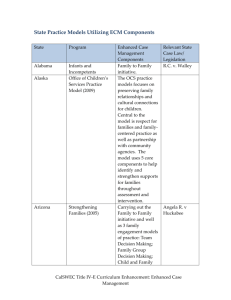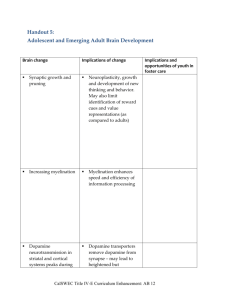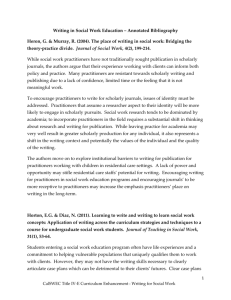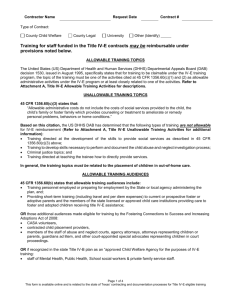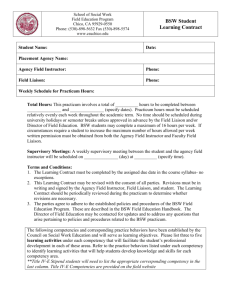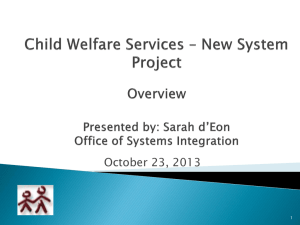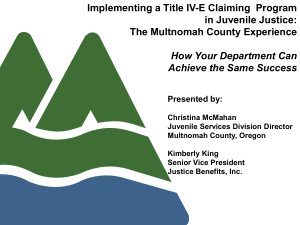Title IV-E Student Handbook - Social Work and Gerontology
advertisement
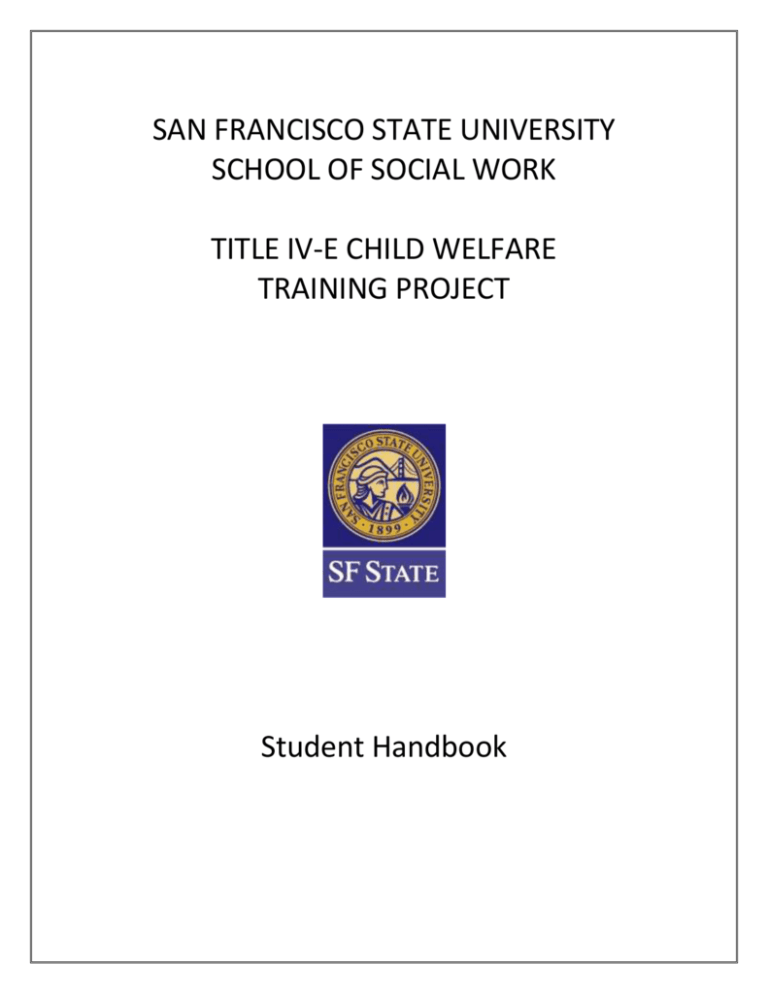
SAN FRANCISCO STATE UNIVERSITY SCHOOL OF SOCIAL WORK TITLE IV-E CHILD WELFARE TRAINING PROJECT Student Handbook SCHOOL OF SOCIAL WORK MISSION STATEMENT The mission of the School of Social Work is to educate students to become competent human service providers for versatile, creative, and sensitive practice in multiple settings and involving diverse populations. The School provides educational foundations that promote just and secure communities, societies, and global networks, as well as fosters leadership, scholarship, and activism, to achieve equity and social justice. TITLE IV-E CHILD WELFARE TRAINING PROJECT About CalSWEC The academic community and the public social services joined forces in 1990 to create the California Social Work Education Center (CalSWEC)—considered the most ambitious such collaboration in the country at the time. Today, CalSWEC is the nation’s largest state coalition of social work educators and practitioners. Unique in its size and scope, CalSWEC’s partners provide professional education, student support, in-service training, and workforce evaluation and research—all directed toward developing effective, culturally competent public service delivery to the people of California. Mission of CalSWEC CalSWEC is a partnership of the schools of social work, public human service agencies, and other related professional organizations that facilitates the integration of education and practice to assure effective, culturally competent service delivery and leadership to the people of California. Goals of CalSWEC CalSWEC’s Mission is supported by the following Goals: Preparing a diverse group of social workers for careers in human services, with special emphasis on child welfare, mental health, and aging fields Defining and operationalizing a continuum of social work education and training Engaging in evaluation, research, and dissemination of best practices in social work Title IV-E Student Handbook Page 2 of 9 Goals of the Title IV-E Program To educate professionals who will be able to advocate effectively for the needs of minority and disadvantaged children and families; To maintain and enhance a collaborative partnership among schools and agencies; and To encourage common definitions of problems facing children and families in order to focus research and development of programs and services that work to alleviate negative human conditions. These goals are based on the following principles: 1. Every child has the right to a permanent home for his or her care and upbringing. Recent child welfare policies reflect societal judgments that the system of temporary foster homes and institutions is not generally a desirable environment for raising children. Furthermore research has indicated that children are harmed emotionally by a lack of permanency in their lives. 2. A caring family is the best and least restrictive environment for raising children. NASW defines the family as “two or more people who consider themselves ‘family’, and who assume obligations, functions, and responsibilities generally essential to healthy family life. 3. A wide range of parenting practices, varying as a result of ethnic, cultural, community, and familial differences, can provide adequate care for children. The ideal of the least restrictive environment includes respecting families’ choices in parenting style, so long as children’s basic needs are met. The value of respecting diversity includes recognition that a diverse society can enrich all of us and should enhance, rather than restrict, individuals’ freedom of choice. 4. The goal of child welfare is to promote the health and safety of children and their development toward a positive, productive adulthood. While priority is given to the protection of children in imminent danger, child welfare services also promote the development of healthy families and communities and work to prevent family dysfunction. 5. In the circumstances of danger to a child, the state has a right to intervene in family affairs to protect the child. In such a circumstance, the safety of the child takes precedence over the rights of parents. 6. Every reasonable effort should be made to preserve and strengthen a child’s existing family before an alternative placement is considered. County departments of child welfare are required to make reasonable efforts to preserve or reunify existing families, unless a court determines that a child’s health or safety would be in jeopardy. 7. Services must be available, accessible, timely, and effective. Long waits and other barriers that would restrict clients’ access to services must be avoided. Services must undergo regular evaluation and modification with the goal of making the must efficient and effective use of agency resources. Program development efforts should be sensitive to community and ethnocultural factors in relation to effectiveness and accessibility. Title IV-E Student Handbook Page 3 of 9 CalSWEC Curriculum Competencies CalSWEC has identified areas of competency students are to achieve while in their master’s program. These competencies include the following broad areas: A full list of the competencies is available by visiting the CalSWEC website at http://calswec.berkeley.edu/files/uploads/pdf/CalSWEC/CW_Competencies_Revised_2011.pdf Field Education Field placements for Title IV-E students will be coordinated by the Title IV-E Project Coordinator and the School of Social Work Field Education Coordinator. Policies and Procedures: The following are School policies regarding academic credit, grading, summer field, repeated placements, use of employment, and insurance, travel and transportation, confidentiality, and sexual harassment: All social work students must complete a minimum of 1200 hours of Field Education for 10 units. The internship begins in September for second year students and October for first year students, and ends at the end of the academic year in May. Students may not "bank" hours, starting early or accumulating extra hours during break in order to complete the internship early. Students are expected to follow the University/School calendar for the student's internship schedules. First year students are expected to be in the field for 16 hours per week, a total of 240 hours or 30 days per semester, for two semesters, for a minimum of 480 HOURS FOR THE ACADEMIC YEAR. Second-year students are expected to be in the field for 24 hours per week - a total of 360 hours or 45 days per semester, for two semesters, for a minimum of 720 HOURS FOR THE ACADEMIC YEAR. Second-year students are in the field 15 weeks per semester. They are generally in the field three days/week (Tuesdays, Thursdays, and Fridays). Advising All new students are assigned an adviser at the beginning of their first semester in the MSW program. It is important to get to know one's adviser as soon as possible to facilitate program planning. Advising Checklist Forms are used by students and their advisers to monitor students' progress in the MSW program Title IV-E Student Handbook Page 4 of 9 Employment Payback Requirement All students are required to fulfill the employment obligation as stipulated by the Title IV-E Student Contract. The School of Social Work shall administer the employment obligation requirement and the financial repayment, if needed. Title IV-E Faculty and Staff Principal Investigator: Dr. Eileen Levy, Director of the School of Social Work, is responsible for the administration of the program and educational direction, program and fiscal operation. Project Coordinator: Gabriela Fischer, MSW, is responsible for the supervision of the program. The PC implements general policy of the program within the School, and develops program policies and procedures. The PC oversees fiscal and programmatic accountability of the program and works with field liaisons and agency representatives to develop and oversee appropriate field placements and experiences for the IV-E students. The PC also represents the School at statewide CalSWEC Project Coordinator and Committee meetings. Project Assistant: Devi Ruslani is responsible for providing administrative support to the Project Coordinator and the Title IV-E Program. She is responsible for assisting with the day-to-day operations of the program. RESPONSIBILITIES OF THE STUDENT 1. To complete their educational requirements within the normative time limits specified by San Francisco State University, and to comply with stipend or reimbursement requirements as specified in the student contract. 2. To make satisfactory academic and professional progress in the MSW program. 3. If employed in a county CWS, to return to that agency and render one year of continuous and satisfactory full-time employment for each year of award. 4. If not employed by a county CW, to seek employment in a county CWS agency and render one year of continuous and satisfactory full-time employment for each year of award. 5. To repay the university for the award and collection costs in the event that the student fails meet the following: satisfactorily completes the academic and field requirements of the MSW program; violates the Code of Ethics of the National Association of Social Workers (NASW); is convicted of a crime involving a child(ren); prior to completion of required employment period, refuses to apply for or accept employment in a county Child Welfare Services Agency; or voluntarily terminates employment or the educational program. Title IV-E Student Handbook Page 5 of 9 Required Title IV-E Courses Along with the required MSW courses, Title IV-E students are mandated to take the following courses in order to complete the curriculum competencies established by CalSWEC: SW 701- Social Policy Analysis (Child Welfare Policy) SW 843 – Child Welfare Practice with Children and Families Training Requirements As stated in the contract, students are satisfactorily complete the courses, trainings, seminars, and field placements designated to meet the requirements of the university. Title IV-E students are expected to attend all seminars in regard to the field placement, and any other training related to child welfare that is mandated by the Title IV-E Project. The Title IV-E Project provides a stipend of $18,500 per year for two years. Students must participate in the full-time MSW program and prepare for careers in public child welfare. The program incorporates child welfare competencies developed by CalSWEC. Current employees of the County Child Welfare Services must be on educational leave (not receiving pay from the agency during the academic year). However, they may work during winter break and summer. Students must agree to participate in the complete child welfare curriculum as defined by the School, including special courses and field education. Students must complete the equivalent of two years of field education. The first year placement must be in a related county or non-profit program serving Title IV-E children and families. Such clients are children and families who would be eligible TANF and receiving child welfare-related services. The second year placement must be in a county Child Welfare agency. Students must agree to undergo pre-screening for county employment (Live Scan fingerprinting, DMV and criminal background checks), have a valid California’s driver’s license, and secure use of a car as required for their field placements. Upon graduation, recipients of the stipend must agree to work in a county Child Welfare Service agency for two years. Criminal Record Clearance Procedures Students who receive the Title IV-E stipend award must attest to the fact that they have never been convicted of a felony or misdemeanor crime or any crime involving harm to children that would disqualify them from service in a county public child welfare services agency. Please be advised that all students will submit must submit to Live Scan and criminal background checks via the Child Welfare Services/Case Management System (CWS/CMS) for second year placements. Title IV-E Student Handbook Page 6 of 9 Early Termination of Title IV-E Training Project If a student terminates the Title IV-E Program before the two years, repayment can begin while he/she is still a graduate student. The program is designed to be a two-year MSW program with a child welfare specialization. If a student is terminated from the Title IV-E program for violation of the CalSWEC contract, School of Social Work requirements, Graduate Studies requirement, or violation of the NASW Code of Ethics, repayment can begin while he/she is still a graduate student. Employment Obligation Students who are county employees A student who is employed in a county public social services agency position or a CDSS position must return to that agency and render one calendar year of continuous and satisfactory full-time employment for each year of full-time or part-time graduate support in a position at a level appropriate to a new MSW in child welfare service. Appointment to and continuation in all such positions shall be subject to all applicable County Civil Service rules and departmental policies. The student must report to work at the assigned position within six (6) months of graduation from the University with a MSW degree. If the County Department is unable to provide appropriate employment within the six (6) month period, the student must seek employment in a county public CWS agency within 75 miles of his/her home. If no county public CWS position is available within a 75-mile radius, the student must seek employment within the State of California in a county public CWS agency. If there is not qualifying County CWS position available within the State of California, the student must then request permission to seek employment in a nonprofit agency serving IV-E clients. Should no qualifying position in a county public CWS agency or CDSS/CWD or within the State of California or in a non-profit agency serving county IV-E child welfare clients be available within 12 months of graduation, the student may apply for a waiver of employment payback requirements. Such a request must be submitted in writing to the Title IV-E Project Coordinator at the University and the student must provide documentation of a comprehensive employment search of all relevant agencies. Title IV-E Student Handbook Page 7 of 9 Students who are not county employees A student who is not employed in a county public social services agency or a CDSS must apply for accept employment in a county public CWS agency in CDSS/CWD in a position at least at the level appropriate to a new MSW in child welfare services within a radius of 75 miles from his/her home. The student must render one year of continuous and satisfactory full-time employment for each year of graduate support. Should no such qualifying position be available within six (6) months from graduation, the student must seek employment within the State of California in a county public CWS agency. If there is no qualifying county public CWS agency position available with the State of California, the student must then request permission to seek employment in a nonprofit agency serving IV-E clients. Should no qualifying position in a county public CWS agency or in CDSS/CWS or within the State of California or in a nonprofit agency serving county IV-E welfare clients be available within 12 months of graduation, the student may apply for a waiver of employment payback requirements. Such a request must be submitted in writing to the Title IV-E Project Coordinator at the University and the student must provide documentation of a comprehensive employment search of all relevant agencies. Employment Search The student has the responsibility of searching and securing a job in public child welfare in a position that is appropriate for an entering MSW. 1. We will assist you in securing employment that will satisfy your employment obligations. 2. You must keep all documents pertaining to your job search. 3. Once you have secured employment, you must have and Employment Verification Form completed and returned to the IV-E office. These forms are completed every six months or four times during your payback period. American Indian Students Students who are American Indian with tribal rights may complete their work commitment in the following settings as alternatives to California CWS: A reservation or Rancheria providing CWS in California; An urban Indian agency in California serving IV-E eligible children and families; or A reservation providing CWS in another state. Title IV-E Student Handbook Page 8 of 9 Financial Repayment Students are responsible for financial repayment of the stipend award and all collection costs under the following circumstances: 1. 2. 3. 4. A student does not graduate from the University due to termination of enrollment. A student leaves the program for any reason. A student declines an appropriate employment. A student fails to qualify for appropriate employment due to: Failing the interview Medical or psychological examination Criminal clearance. 5. A student is discharged from county employment. 6. A student is terminated prior to completion of the employment obligation. 1. A student unsatisfactory work performance due to: Inadequate professional performance A felony conviction during program participation and/or employment obligation period. Conviction of a crime involving harm to children. Improper conduct as described by County Code/Merit System or Classified Personnel System Violation of the NASW Code of Ethics. Terms of Financial Repayment Interest rate of 6%, collection costs, and repayment periods will be negotiated with the Loans and Receivable Departments of the University in all repayment situations. Any money recouped from students will be forwarded to CalSWEC and deducted from future charges to the State and federal governments. Delay of Graduation Students who cannot complete graduation requirements because of personal hardship or disability must notify the Title IV-E program and request either a DEFERRAL or repay the stipend award received. Deferrals are approved for no more than one year. Interruption of employment obligation due to serious hardship, disability, or death A student shall notify the Title IV-E program if employment obligation is interrupted. In case of death, disability, or serious hardship, the Title IV-E program may waive the employment obligation, pending approval from CalSWEC. Title IV-E Student Handbook Page 9 of 9
